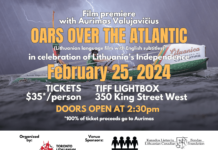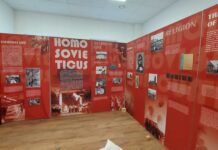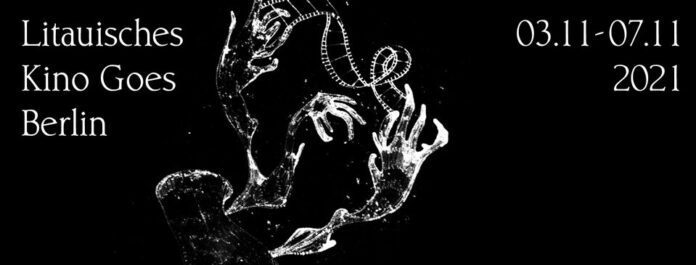
LTKinoGoesBerlin
The 11th edition of the LITAUISCHES KINO GOES BERLIN film festival took place between November 3rd and 7th, 2021. The festival presented the best short and feature films from Lithuania to Berlin viewers at the Sputnik and Acud theatres, with new productions as well as festival highlights and renowned classics. This year the programme also included a lecture focusing on female perspectives in Lithuanian cinema and a photo exhibition on cinema culture in Lithuania. Festival Founder Giedrė Šimanauskaitė was pleased to open the festival entering its second decade.
As part of the Festival Pearls program, current Lithuanian cinema and festival hits from recent years were presented. With Isaac (2019), director Jurgis Matulevičius shows a film about guilt, friendship, love and self-liberation in the complex context of the Holocaust and the Soviet post-war period in Lithuania. In 1941 the Lithuanian activist Andrius Gluosnis kills the Jew Isaac during the massacre in the garages of Lietūkis. Years later, in Soviet Lithuania, his friend, the film director Gutauskas, returns from the USA with a script for a film that tells in detail the murders and the situation in which Isaac is killed. It becomes evidence of a KGB investigation into the events of 1941. Gutauskas becomes the prime suspect. While preparing for the film, Gluosnis’ life collapses – plagued by guilt, he realizes that he must make peace with the victim. In 2020, ISAAC was among the nominees for the “Prix FIPRESCI” for best debut film at the European Film Awards.
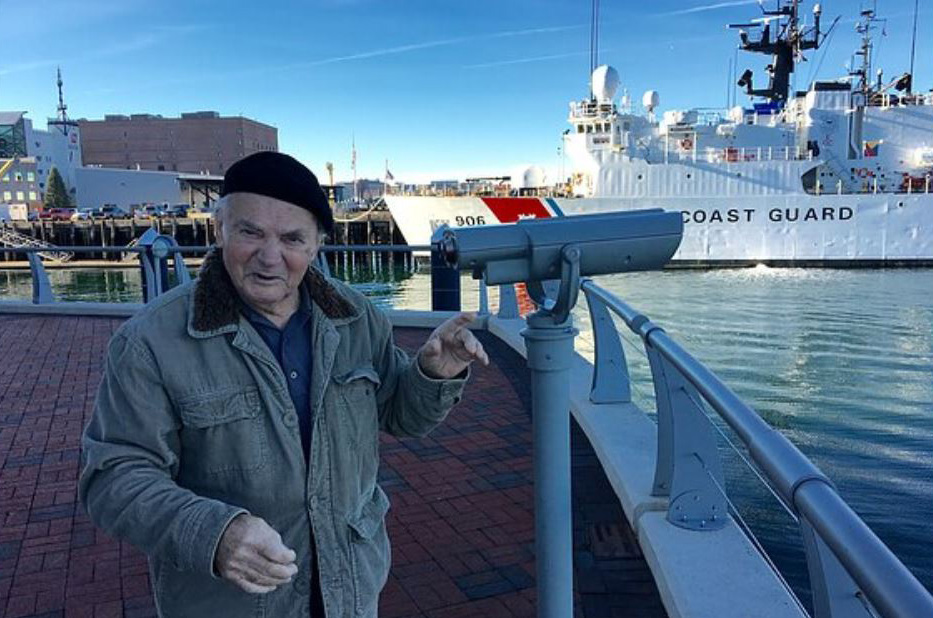
In The Jump (2020), director Giedrė Žickytė takes us to the coast of Martha’s Vineyard, where in November, 1970 an American patrol boat awaits a Soviet ship to negotiate fishing rights. During the meeting, Lithuanian radio operator Simas Kudirka jumps onto the deck of the American ship and asks for asylum. Contrary to his hope of freedom, the Americans hand him back to the Soviet officers, and Kudirka is convicted of treason. The failed escape develops into a media phenomenon and causes a bitter political fight that pays off in the end: Kudirka is allowed to enter the USA. Using archival material, contemporary witness reports and Kudirka himself, the audience experiences the personal journey of a man who has never given up hope for justice. The Jump has won numerous awards since its premiere in autumn 2020, including the award for best documentary at the Warsaw International Film Festival (Poland) and audience awards at DOC NYC (USA) and DocVille (Belgium).
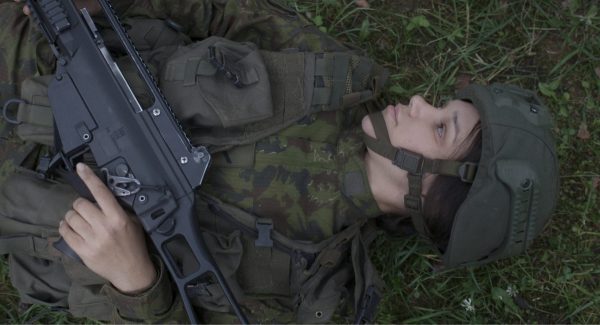
Gentle Warriors (2020) by Marija Stonytė is a documentary which follows three young women who volunteer for military service after male drafting is reintroduced in Lithuania in response to possible threats from neighbouring Russia. The girls live and train with 600 men on a remote military base for 9 months. The film, showing the protagonists in their civil life as well as in their military combat roles, presents complex and multifaceted portraits of young women who follow their own will.
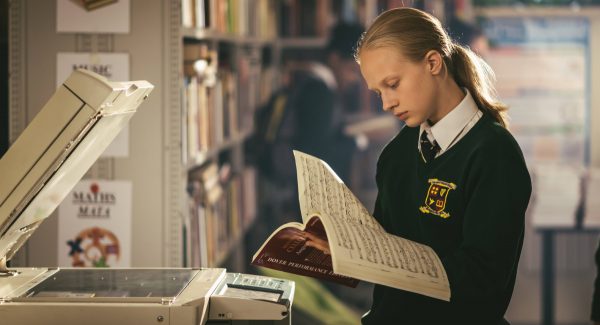
In the coming-of-age drama The Castle (2020), Lina Lužytė tells the story of Monika, a 13-year-old Lithuanian girl who recently moved to Dublin with her mother and her grandmother who has dementia. A passionate singer, Monika urges her mother – a professional pianist – to keep playing with her. The mother now works in a fish factory to pay the bills. When the two are invited to play at “The Castle”, Monika’s mother refuses and does not want to give her the 120 euros she needs to rent a keyboard. Determined to attain her goal, the desperate Monika kidnaps her own grandma and demands the ransom from her mother.
Shorts shown at the opening of the Festival were Eine Schokoladen Lampe by Andrius Bartkus, Through the Fields (Laukai) by Kamilė Milašiūtė, Advice (Konsultacija) by Adas Burkšaitis, A Dog Named Sheep (Šuo vardu Avis), by Giedrė Narušytė Boots, Places (Miegamasis rajonas) by Vytautas Katkus, Limousine (Limuzinas) by Saulė Bliuvaitė, and It’s Alright (Viskas gerai) by Jorūnė Greičiūtė. The Short Film Competition Audience Award winner was Eine Schokoladen Lampe by Andrius Bartkus. This year’s prize was a residency at the Nida Art Colony.
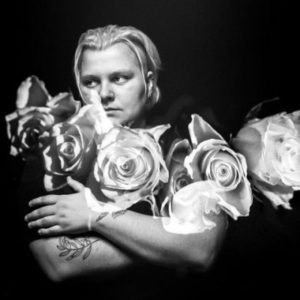
Part of the program was a concert on November 3, performed by Rūta Mur. She is a promising Lithuanian music artist, who creates songs based on emotional feelings mixed with a sense of nostalgia and a deeply touching musical atmosphere. Her music is often described as the Portuguese Saudade: a deep emotional state of nostalgic or profound melancholic longing for an absent loved one. On the stage, she performs solo with a microphone, giving the audience an extended intimate experience of one person who is telling her stories of happiness and sorrow, celebrations and downfalls.
Another unique performance was called Human Mystery Equals That of an Insect by IKRA. Early films of puppet animation meet the multi-instrumental orchestra IKRA to create an interdisciplinary performance combining sight and sound. The creative energy of a collective of musically minded friends accompany bugs from the films of Ladislas Starevich, the Polish-Lithuanian stop-motion animation pioneer, come to life on screen. The audience is treated to “hectic grooves, funky moves, sleazy beats and grimy screams from the underbelly of Kaunas, combined with deep drones, atmospheric vocals, blasting electronics and funky basslines”.
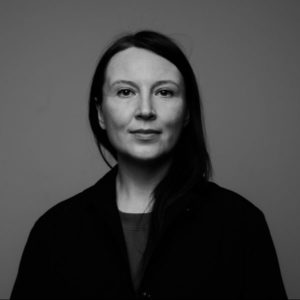
A lecture on Women In Lithuanian Contemporary Cinema was also featured, with Lina Kaminskaitė, a film and media researcher, Associate Professor at the Vilnius Academy of Music and Theatre, Affiliated Researcher at Utrecht University. In her talk she presented the development of Lithuanian contemporary cinema from a feminist film research perspective, and showed how the female filmmakers’ status has changed within the film industry, introducing leading filmmakers, their films and main topics they explore. The presentationwass based on the recently published book In Focus: Women in Lithuanian Cinema compiled by Dr. Natalija Arlauskaitė and Lina Kaminskaitė. It is the first attempt to apply a feminist approach to Lithuanian film studies employing the perspectives of eleven different authors.
From November 3 to 24, the festival hosts the photo exhibition Cinemas in Lithuanian Regions in cooperation with the media education and research centre Meno Avilys at Sputnik Kino Berlin. The exhibition features photographs of preserved Lithuanian cinemas, their interiors and portraits of the people who used to or still work at these film screening venues. Among them are four fully operating cinemas – the cinema Dainava in Alytus, Spindulys in Marijampolė, Minija in Gargždai, and Virinta (founded by the community) in Alanta. Other cinemas displayed in the exhibition now house second-hand furniture shops, stores, day and youth centres, as well as various other small businesses.
In all, a fascinating and richly programmed festival which would be welcomed in any city! Many of the film trailers are available on YouTube.
News from LITAUISCHES KINO GOES BERLIN







